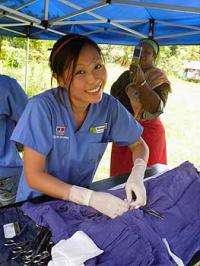Action needed on Samoan dogs

Massey University researchers say more must be done to humanely manage the canine population in Samoa.
Dr Els Acke and Dr Kate Hill in collaboration with Mark Farnworth, a Massey PhD student who is a lecturer at Unitec, have carried out a number of research projects in Samoa.
Massey University veterinary science students have also visited Samoa regularly and in conjunction with the Animal Protection Society of Samoa, have neutered over 900 dogs.
Dr Hill, of the Institute of Veterinary, Animal and Biomedical Sciences, says work is needed to help limit the spread of disease, improve the welfare of dogs and protect locals and tourists from bites. "Strategies must include education and improved veterinary provision if dogs and people are to benefit in the long-term."
She says dogs in Samoa live a different life than that of New Zealand dogs. "They are never kept on a leash, and even though most dogs technically are owned by someone they are free to roam the streets, so they often get hit by cars."
But Mr Farnworth says while it may seem these dogs are ownerless and not cared about, the reality is different. "My research indicates that these dogs are still important to the Samoan people and described by many as 'one of the family'," he says. "A recent survey also shows tourists are generally sympathetic to the plight of these dogs."
A study conducted of tourists in Samoa, recently submitted for publication, found 64 per cent of tourists had had a negative interaction with a dog while there. More than 80 per cent of tourists said there needed to be better management of the dog population and nearly all respondents felt humane management was the most important tool to achieve that end.
Dr Hill says one of the major issues is disease, as a number of easily prevented diseases and parasites are rife in the Samoan dog population.
"The high population of dogs, and their close contact with people, make them a possible threat to public health since they may pose as reservoirs for agents causing human disease," she says. "A masters project conducted by Ros Carslake, tested 242 dogs during 2010-11 for a number of diseases and found that more than 90 per cent had hookworm. Almost half had another parasite, Dirofilaria immitis (heart worm), while other diseases were also common."
The research findings show a need for more dialogue around the provision of veterinary services and humane population management for dogs in Samoa, the group says. "It is apparent a better management programme will improve the experience of local Samoans, visitors to Samoa and Samoan dogs alike."
Provided by Massey University
















